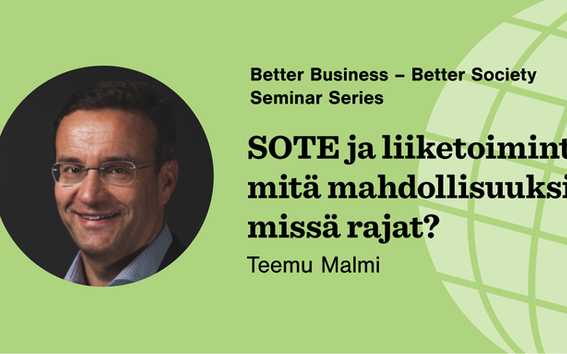Private sector can help Finland solve health and social services problems

‘The rise in social welfare and health care expenditures must be brought under control. The problem is that they have been rising faster than GDP for years now already. Economic growth has finally sped up again in recent years, so the problem in relation to GDP has not been the same as before, but if GDP growth slows down again, the problem will continue,’ says Teemu Malmi, Professor of Accounting at Aalto University School of Business.He has studied business and the opportunities and limitations it presents in relation to the social welfare and health care sector.
According to Professor Malmi, the problem does not go away even if GDP increases. This is due to the ageing of our population. As the population ages, the share of carers increases while the number of taxpayers decreases – in other words, the dependency ratio gets worse. At the same time, medicine and health technology are rapidly developing. This means individual treatment is getting easier and better, which means there are opportunities to provide better treatment. These treatments, of course, will probably cost more than the previous ones.
‘This means that in this welfare society, the question arises as to who will tell the people that even though a better treatment exists, it is not available to them. These types of prioritisation discussions have been poorly handled in Finland. There will also be a shortage of labour in the health and social services sector, which will push costs upwards. It is easy to say at the board level that we will hire more doctors, but the reality is that even at the moment not all vacant posts can be filled,’ Professor Malmi explains.
Could the problem be solved by the private sector taking on the running of some social welfare and health care services?
‘Private sector actors have an intrinsic motivation for operating efficiently because they have to make profits. We have many municipalities that have outsourced social welfare and health care services and achieved lower costs and greater service availability as a result. There is also evidence that private sector organisations can provide services at a lower cost. Of course, there have also been problems in the care of the elderly, so the activities of private companies in the health and social services sector should of course be monitored and regulated,’ Professor Malmi continues.
Too few successful small- and medium-sized companies
According to Professor Teemu Malmi, business involvement in the provision of social welfare and health care services can also create other kinds of positive spin-offs for society. When people think of their activities as a business, other useful aspects can emerge in addition to just efficiency, such as opportunities for expanding commercial operations overseas.
‘The majority of our exports and success at the international level continue to come from a few large companies – we have a shortage of successful small- and medium-sized companies. Aalto has already achieved a lot of good results in this area, but with the huge amount of medicine and health technology expertise that exists and the incredible data banks that hospitals have, there are certainly even better business opportunities to take hold of.’
‘Here, there will of course arise questions of legislation, of who can use the data and in what way, and of who actually owns the data. Will citizens block the use of their data? Will hospitals provide access to the data, and to who and for what price? Bottlenecks in the Finnish system should be dismantled in order to create successful global start-up activities in our country, and state funding to health technology start-ups should be more focused on grants that loans,’ Professor Malmi concludes.
See also the event details for the Better Business – Better Society seminar on Thursday 6 February.
Professor Teemu Malmi was interviewed by Terhi Ollikainen.
Read more news

Join the Unite! Virtual Education Summit- Registration now open
Join us in shaping international collaboration! This online event takes place 12 March, 2026.
Apply Now: Unite! Visiting Professorships at TU Graz
TU Graz, Austria, invites experienced postdoctoral researchers to apply for two fully funded visiting professorships. The deadline for expressions of interest is 20 February 2026, and the positions will begin on 1 October 2026.Soil Laboratory Exhibition – Exploring the Dialogue Between Human and the Earth in Utsjoki
Soil Laboratory explores the relationship between humans and the earth as a living landscape through ceramic practices in Utsjoki.






